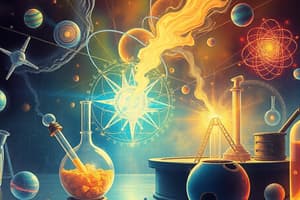Podcast
Questions and Answers
Which of the following scenarios best exemplifies the principle of skepticism in scientific inquiry?
Which of the following scenarios best exemplifies the principle of skepticism in scientific inquiry?
- A scientist designing an experiment without considering potential sources of error to expedite the research process.
- A team of researchers independently replicating an experiment to verify the original findings before incorporating them into a meta-analysis. (correct)
- A pharmaceutical company promoting a new drug based solely on initial positive trial results, without conducting further studies.
- A researcher immediately accepting a published study's conclusions because it aligns with their own beliefs.
A study finds a strong positive correlation between ice cream sales and crime rates. Which conclusion represents the most appropriate application of scientific reasoning?
A study finds a strong positive correlation between ice cream sales and crime rates. Which conclusion represents the most appropriate application of scientific reasoning?
- The correlation is coincidental and should be disregarded because ice cream and crime are unrelated phenomena.
- The study proves that buying ice cream causes people to commit crimes, warranting immediate policy interventions.
- Increased ice cream consumption directly leads to criminal behavior due to sugar-induced hyperactivity.
- A confounding variable, such as warmer weather, likely influences both ice cream sales and crime rates independently. (correct)
Which of the following most accurately describes the role of scientific theories?
Which of the following most accurately describes the role of scientific theories?
- They are unchangeable laws that dictate the behavior of the universe under all conditions.
- They are preliminary guesses that scientists use as starting points for research.
- They are speculative ideas that have not yet been tested through experimentation.
- They are well-substantiated explanations of the natural world, supported by repeated observations and experiments. (correct)
A researcher discovers a new species of bacteria in a remote cave. Which actions would best demonstrate adherence to ethical principles in scientific conduct?
A researcher discovers a new species of bacteria in a remote cave. Which actions would best demonstrate adherence to ethical principles in scientific conduct?
In the context of the scientific method, what is the primary purpose of formulating a prediction after developing a hypothesis?
In the context of the scientific method, what is the primary purpose of formulating a prediction after developing a hypothesis?
Why is objectivity considered a cornerstone of scientific investigation?
Why is objectivity considered a cornerstone of scientific investigation?
How do scientific laws differ fundamentally from scientific theories?
How do scientific laws differ fundamentally from scientific theories?
A team of ecologists is studying the impact of deforestation on biodiversity. Which approach would best integrate empiricism and rationalism to address the research question?
A team of ecologists is studying the impact of deforestation on biodiversity. Which approach would best integrate empiricism and rationalism to address the research question?
Which consideration is most vital when assessing the limitations of scientific inquiry?
Which consideration is most vital when assessing the limitations of scientific inquiry?
Considering the interdisciplinary nature of modern scientific research, what strategy would be most effective for addressing complex global challenges such as climate change?
Considering the interdisciplinary nature of modern scientific research, what strategy would be most effective for addressing complex global challenges such as climate change?
Flashcards
What is Science?
What is Science?
A systematic approach used to understand the natural world through observation, experimentation, and analysis.
Empiricism in Science
Empiricism in Science
Science relies on observable evidence and data to support claims and theories.
Rationalism in Science
Rationalism in Science
Logical reasoning and critical thinking that are essential for interpreting data and constructing explanations.
Observation
Observation
Signup and view all the flashcards
Hypothesis
Hypothesis
Signup and view all the flashcards
Experiment
Experiment
Signup and view all the flashcards
Natural Sciences
Natural Sciences
Signup and view all the flashcards
Scientific Theories
Scientific Theories
Signup and view all the flashcards
Scientific Laws
Scientific Laws
Signup and view all the flashcards
Correlation vs. Causation
Correlation vs. Causation
Signup and view all the flashcards
Study Notes
- Science employs a systematic, organized method to explain the natural world through observation, experimentation, and analysis.
- Science includes a broad spectrum of disciplines, each investigating distinct facets of the universe.
- Scientists use the scientific method to examine phenomena, gain insights, or refine existing understanding.
Core Principles
- Empiricism emphasizes observable evidence and data as the foundation for scientific claims and theories, with knowledge primarily coming from sensory experience.
- Rationalism deems logical reasoning and critical thinking essential for data interpretation and explanation development.
- Skepticism subjects scientific claims to constant scrutiny and welcomes new evidence that could challenge current theories.
- Objectivity requires scientists to minimize biases in their work, ensuring findings reflect evidence, not personal opinions.
Scientific Method
- Observation starts with noticing a phenomenon or pinpointing a problem needing investigation.
- Hypothesis involves creating a testable explanation or prediction from initial observations, serving as a provisional answer.
- Prediction states expected outcomes if the hypothesis is correct; it is often phrased as an "if-then" statement.
- Experiment includes designing and performing controlled tests to gather relevant data for testing the hypothesis.
- Analysis assesses data collected during experiments to see if the evidence confirms or denies the hypothesis.
- Conclusion involves making decisions based on analyzed data, which either supports or rejects the initial hypothesis.
- Communication disseminates findings within the scientific community through publications and conferences.
Branches of Science
- Natural Sciences explore the physical world and natural occurrences.
- Physics studies the core principles of matter, energy, space, and time, covering mechanics, thermodynamics, electromagnetism, optics, and quantum mechanics.
- Chemistry deals with the makeup, structure, characteristics, and reactions of matter, including atoms, molecules, and their interactions.
- Biology studies living things, focusing on their structure, function, growth, evolution, and distribution, including botany, zoology, microbiology, and genetics.
- Earth Science studies the Earth's structure, composition, processes, and history, incorporating geology, oceanography, meteorology, and environmental science.
- Social Sciences focus on human society and relationships.
- Psychology investigates the human mind and behavior, including cognitive, developmental, social, and clinical areas.
- Sociology studies social structures, institutions, and group dynamics, addressing inequality, social change, and social interactions.
- Economics examines the production, distribution, and consumption of goods and services, dividing into micro and macroeconomics.
- Political Science studies political theory and governmental practices, looking at systems, institutions, and behavior.
- Anthropology explores human cultures, societies, and their development through cultural, physical, and archaeological perspectives.
- Formal Sciences study formal systems like logic, mathematics, and computer science.
- Mathematics explores abstract structures, relationships, and patterns, including arithmetic, algebra, geometry, calculus, and statistics.
- Logic examines the rules of valid reasoning and argumentation.
- Computer Science concentrates on computation, algorithms, and information processing.
Scientific Theories
- Scientific theories explain aspects of the natural world and rely on facts repeatedly confirmed through observation and experimentation.
- Theories are not mere guesses but robust frameworks that predict outcomes and direct future research.
Laws
- Scientific laws are descriptive statements that describe invariable relationships under specific conditions.
- Laws are often mathematical and universally applicable.
Technology and Innovation
- Science advances technology by providing knowledge for new tools and techniques.
- Innovation drives scientific discovery with new instruments that allow detailed exploration.
Impact of Science
- Medicine benefits from vaccines, antibiotics, and diagnostic tools.
- Agriculture sees improvements in crop yields, pest control, and food production.
- Energy benefits from renewable sources and efficient technologies.
- Communication advances through telecommunications, the internet, and devices.
- Transportation evolves with airplanes, automobiles, and other means.
Limitations
- Science is limited by what it can observe, measure, and test.
- Science cannot answer subjective or moral questions.
- Scientific knowledge is subject to change based on new evidence.
Misconceptions
- A hypothesis is a testable explanation, while a theory is supported by extensive evidence.
- Correlation indicates a relationship, but not necessarily causation.
- Science provides supporting evidence rather than absolute proof.
Ethics
- Scientific Conduct: Scientists must be honest, objective, and respect intellectual property.
- Responsible Research: Scientists must consider and minimize the social and environmental impacts of their research.
- Informed Consent: Human research requires informed consent, with participants understanding risks and benefits.
Studying That Suits You
Use AI to generate personalized quizzes and flashcards to suit your learning preferences.




